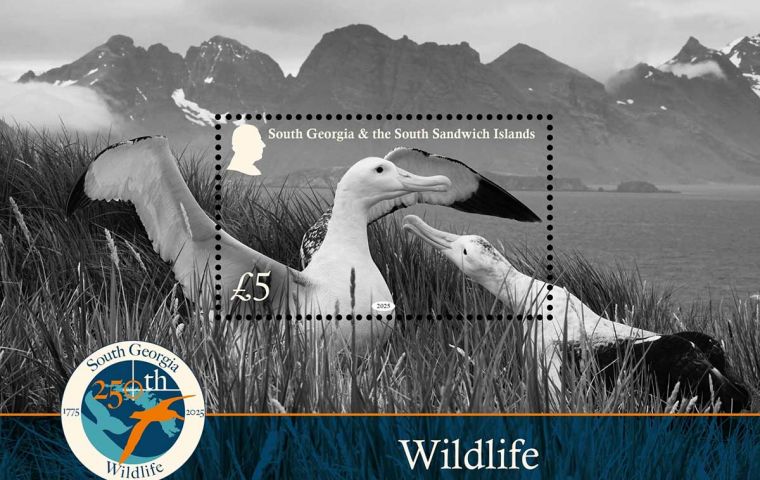MercoPress. South Atlantic News Agency
Commemorative issue of South Georgia Wildlife stamps
 In the last 250 years, attitudes towards wildlife have changed fundamentally
In the last 250 years, attitudes towards wildlife have changed fundamentally Two-hundred and fifty years ago, January 1775, Captain James Cook landed at Possession Bay and took possession of the island, in the name of King George III and his heirs. In this anniversary year we celebrate South Georgia and its change from a little known and little valued island to a thriving UK Overseas Territory which is globally renowned for championing science, conservation and sustainable management.
Each set of wildlife stamps focuses on a different element of South Georgia and shine a light on both its history and its future. This third issue is a commemorative set and focuses on wildlife – a feature of South Georgia which is cherished above all others and now attracts tourists and scientists from across the globe, but which once was seen purely through a lens of exploitation. In the last 250 years, attitudes towards wildlife have changed fundamentally.
When first exploring the island, Cook noted the abundance of fur seals, elephant seals and whales and saw them purely as a resource to be harvested. It is estimated that up to 1.2 million Antarctic fur seals were killed in the 100 years after the islands discovery nearly wiping the species out on the island. Elephant seals were also heavily hunted for their rich blubber and up to 800,000 were taken across the region. Seabirds were also impacted with penguins being targeted for fat, oil, meat and feathers, and the eggs of other seabirds would have been taken without thought for longer term population impacts.

This issue is a commemorative set and focuses on wildlife – a feature of South Georgia
which is cherished above all others and now attracts tourists and scientists from across the globe
This unsustainable harvesting led to the crash in populations of many species, and they were only left to recover once it was no longer economical and attention shifted to whaling. In addition to being directly impacted by humans, South Georgia wildlife was also indirectly impacted by those early explorers when invasive species such as rats and mice were inadvertently brought ashore with supplies and in shipwrecks. The invasive rodents decimated the island’s bird populations and predated on the eggs and chicks of ground and burrow nesting birds.
With the abundance of food, and in the absence of any natural predators, rodent populations grew rapidly. It was not only on land that South Georgia’s wildlife suffered at the hands of humans. Up until the late 1990’s, longline fisheries operating close to the island would catch scores of seabirds on their baited hooks and populations of species such as albatross that are slow to reproduce were heavily impacted. Fast forward to the current day, and approaches to wildlife management have profoundly changed.
Wildlife is now protected both on land and at sea. Marine and Terrestrial Protected Areas cover the entirety of South Georgia and strict regulations ensure that the food sources for marine mammals are protected and they remain undisturbed at their breeding sites on land. Invasive rodents have been removed in a landmark eradication project and populations of birds that were once near extinction are once again thriving.
Strict biosecurity measures are in place, both on South Georgia and at gateway ports, to make sure that rodents do not return. In the Marine Protected Area, all fishing activities are now strictly regulated and world-leading measures in bycatch mitigation mean that bird bycatch is near zero. On land tourists marvel at beaches that are crowded with seals and penguins and, by working closely with the International Association of Antarctic Tour Operators, visitors are educated to understand how to act in a way that does not disturb the animals they have come to see. To ensure that South Georgia’s wildlife remains fully protected, ongoing research and monitoring efforts continue to inform management decisions and assess the impact of human activities on the ecosystem.




Top Comments
Disclaimer & comment rulesCommenting for this story is now closed.
If you have a Facebook account, become a fan and comment on our Facebook Page!